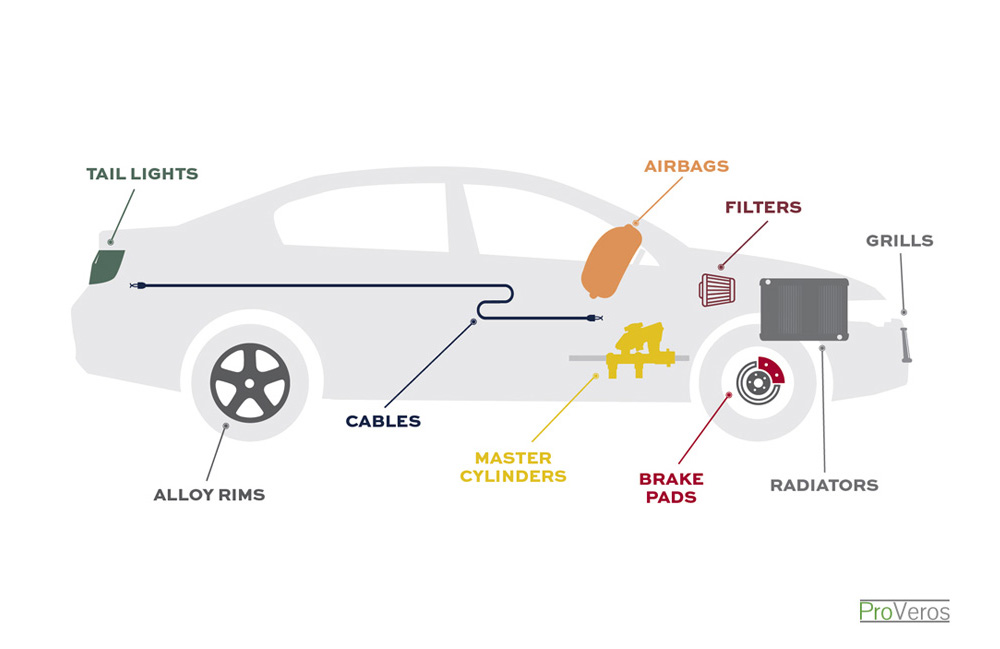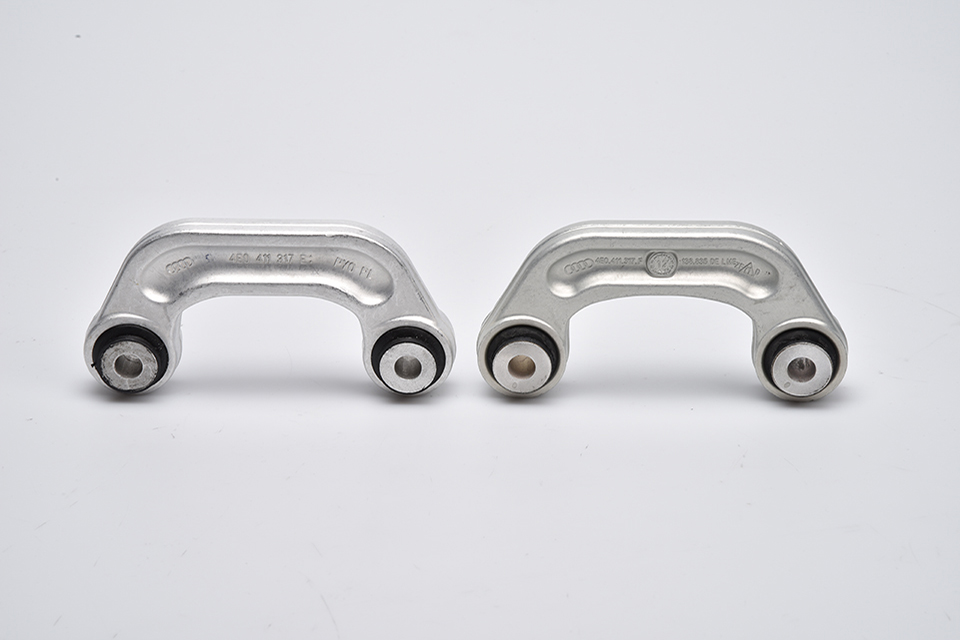
New Guidance Launched Following Significant Increase In Sales Of Fake Car Parts
 Car Parts, Fake Car Parts
Car Parts, Fake Car PartsThe UK Intellectual Property Office (UKIPO) has issued new guidance to warn consumers of the serious dangers of purchasing counterfeit car parts as part of its campaign activity.
The volume of fake car parts flooding the EU market has risen significantly with greater than £1.8 billion lost every year to counterfeit tyres and batteries alone.
The most common fake parts worldwide consist of filters, brake pads, lights, wheels and airbags. Spotting counterfeit parts is no easy task which is highlighted in the example below featuring a genuine Audi coupling rod (on the right), and a fake.
Many of these parts have direct safety implications which can lead to serious accidents if they fail. BMW has highlighted this issue in the video below:
To help combat the rise in counterfeit parts IPO has joined forces with the motor industry, trading platforms and other key areas of government. This collaboration is working to provide guidance to consumers on how to avoid buying fake parts both online and on the high street.
To date, this is the most extensive collaboration of its kind and involves:
- Audi
- BMW
- Independent Automotive Aftermarket Federation (IAAF)
- Manufacturers Against Product Piracy (MAPP)
- TecAlliance
- Independent Garage Association (IGA)
- Amazon
- eBay
- Trading Standards
- Police Intellectual Property Crime Unit (PIPCU)
- M-Sport
- Motor Sport Association UK (MSA)
- International Automobile Federation (FIA)
- NGK Spark Plugs
- TMD Friction
- Philips Automotive
PIPCU, run by the City of London Police seeks to stamp out crimes of this nature. Robert Czernik was sentenced to 10 months in prison, suspended for 12 months in February 2018 for selling counterfeit airbags.
Dr Ros Lynch, Director of Copyright and Enforcement at the Intellectual Property Office said:
“It’s clear counterfeit vehicle parts can pose a serious risk to drivers, passengers and other road users, with potentially life-threatening results. Criminals who produce counterfeit vehicle parts have no concerns about public safety and they use this as an opportunity to profit at the expense of others.”
“We are committed to protecting the public from these dangers. This collaboration between government, industry and law enforcement offers us an opportunity to raise awareness, change consumer behaviour and remove these dangerous products from the market.”
Temporary Detective Chief Inspector Nick Court of the City of London Police’s Intellectual Property Crime Unit (PIPCU) said:
“Counterfeit car parts increase the risk of people experiencing a serious injury. It’s essential that car owners and those who work in this industry are made aware of the signs to look out for and the risks.”
“The City of London Police is at forefront of fighting this type of crime and offering the public advice on how to avoid falling victim.”
Audi’s Brand Protection Team said:
“Identifying counterfeits has proven to be a real challenge. The sellers’ websites are becoming more and more professional, appearing legitimate to many buyers at first glance. But there are some clues that give counterfeiters away and should put buyers on alert, such as a comparatively cheap price or a typo appearing on the spare part or in the description.”
“The counterfeiters aren’t choosy when it comes to selecting fakes. According to our investigations, a large number of spare parts are counterfeited in the automotive business. These include service-relevant components, such as oil filters or air filters, crash-relevant components such as bumpers, radiator grille or bodywork, but also safety-relevant parts such as suspension arms, exhaust systems or brake linings.”
“Spare parts produced using inferior materials clearly pose high risks for Audi consumers. We are pleased to be part of this campaign to warn and protect our customers.”
Matt Jones, partner at EIP, commented:
“Under the Trade Marks Act in the UK (specifically, section 92 of the Trade Marks Act 1994), it is a criminal offence for a counterfeiter to apply a brand owner’s trademark to their counterfeit goods. The counterfeiter does not have to cause any harm with their counterfeit goods in order to commit a crime under the Trade Marks Act; they don’t even have to have the intent to cause harm. They just have to have the intent to make [commercial] gains for themselves or the intent to cause loss to another, such as the legitimate brand owner.”
“To fall foul of this provision, the counterfeiter does not even have to apply the trademark to the goods directly; it is enough if they apply it to the packaging. Also, counterfeiters can’t rely on small deliberate (or accidental) differences between the signs they use and the legitimate trademark to get them off the hook. It is enough if the signs they use are likely to be mistaken for the legitimate trademark. So, counterfeiters can’t just misspell or tweak trademarks on their fake products and think they can get away with it.”
“Finally, while prison sentences under section 92 of the Trade Marks Act are often measured in months, it is worth noting that sentences can be imposed of up to ten years. Oh, or an unlimited fine. Or both. So, counterfeiters beware!”
Whilst it’s clear to see that positive action has been (and continues to be) taken to inform consumers of how to identify and avoid counterfeit parts, the marketplace will still contain potentially fatal fakes. Therefore, it’s important that you exercise caution and common sense, especially if the price of a part seems too good to be true.
We are one of the UK’s leading providers thousands of quality, tested and trusted used car parts for almost any make and model. Purchasing genuine parts through us gives you all important peace of mind that the genuine parts you are fitting meet safety guidelines that protect you, your passengers and also fellow road users. To explore our vast range of car parts in stock for fast delivery click here.
Nearside vs Offside – How to Tell the Difference
 Car Door Mirror, Car Parts, Car Parts Online, Nearside, OEM Parts, Offside, Spare Parts, Used Car Parts, Wing Mirror
Car Door Mirror, Car Parts, Car Parts Online, Nearside, OEM Parts, Offside, Spare Parts, Used Car Parts, Wing Mirror Common Ford 1.0L EcoBoost Engine Problems
 EcoBoost, Engine Problems, Engine Replacement, Ford, Used Car Engines
EcoBoost, Engine Problems, Engine Replacement, Ford, Used Car Engines 






